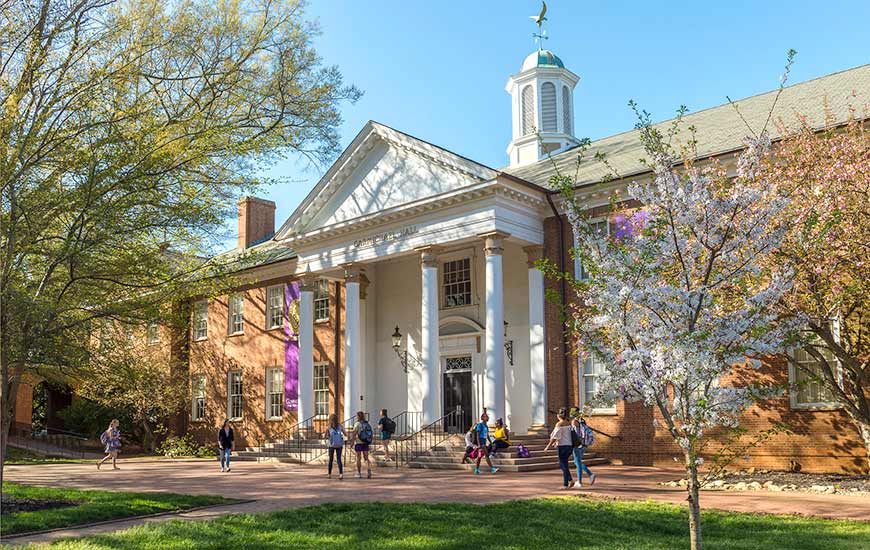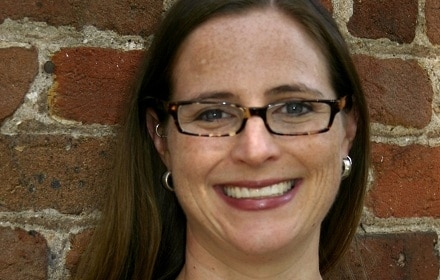Bringing Literature to Life: Dr. Erin Templeton

Scholarly Interest Transatlantic Modernism, focusing on American, British and Irish literature written between the years 1900-1950.
Travel “I’ve traveled to libraries and archives all over the world. I’ve seen original copies of letters from T. S. Eliot to various friends, read the personal journal of Eliot’s first wife, Vivien, and studied Yeats and Joyce in Ireland, Sligo and Dublin respectively. Teaching Shakespeare in Stratford-Upon-Avon and London was also an invaluable experience. Along the way, I’ve been fortunate to meet a number of interesting and impressive people who have not just challenged my ideas and broadened my thinking but have also enriched my life in innumerable ways.”

Upcoming Projects “I am developing a book proposal based on my dissertation manuscript. I am also looking forward to revising an article on issues of authorship and gender in The Waste Land and thinking about the significance of Shakespeare’s play Troilus and Cressida for American poet William Carlos Williams and his poem Paterson. The Williams piece got its start as a conference paper for the William Carlos Williams Society panel at the annual MLA conference in 2006, and I’m excited to be able to expand those ideas into essay form.”
Current Project I recently completed an essay which explores the friendship and poetic cross-pollination of William Carlos Williams and Italian poet Emanuel Carnevali. Now all-but-forgotten, Emanuel Carnevali was an important member of the early twentieth-century literary landscape, especially in the Little Magazines culture, which was some of the most important outlets of modernist publication at the time. This article, which will appear in a special edition of the William Carlos Williams Review, centers on their contributions to Others and the ways that Carnevali challenged Williams’s ideas about poetry and literature. This essay will appear in the William Carlos Williams Review. I’m currently working on an essay which explores F. Scott and Zelda Fitzgerald’s marital relationship and the network of texts which it produced in the years 1928-1935, specifically Save Me the Waltz and Tender is the Night. I argue that these texts are not mere instances of literary appropriation or thinly-veiled autobiography, but instead, they are examples of a complex and gendered network of associations that challenge understanding of authorship as well as the boundaries between life and art.
Recent Recognitions Contributing Writer for ProfHacker.com, in the Chronicle of Higher Education, Converse College Summer Research Grant; NEH fellowship; Teagle Grant; “The eternal bride and father—quid pro quo’: William Carlos Williams, Marcia Nardi and Paterson,” The Heritages of William Carlos Williams: Points of Contact; Vice-President of the William Carlos Williams Society.
Recent Conferences and Presentations “The Open Professoriate: Public Intellectuals on the Social Web,” Modern Languages Association Annual Convention, Los Angeles, CA 6-9 January 2011. “‘Plagiarism Begins at Home’: The Textual Intimacies of F. Scott and Zelda Fitzgerald,” Modern Studies Association Annual Convention, Victoria, British Columbia, November 11-14, 2010. “Who is the third who walks always beside you?”: Complexities of Authorship in The Waste Land,” T. S. Eliot Society 30th Annual Meeting, St. Louis, MO, September 25–27, 2009. “Virgin Womb(s) of the Imagination: James Joyce and the Erotics of Authorship,” Twenty-First Annual James Joyce International Symposium, Tours, France, June 15-21, 2008.
Pedagogical Methodologies “My pedagogy is deeply invested in the idea that literature is the product of its historical, political, and social contexts. One of the wonderful things about the humanities is that there can be more than one reading of a given text; in fact, most texts will support multiple and sometimes contradictory interpretations. As a result, I find that it is more useful in the classroom to employ the critical frames and methodologies than to argue for a particular reading of a poem or novel. If a student can put forth an eloquent and persuasive reading of a text and can support that reading with textual evidence, I am thrilled, even if I myself have interpreted that same text differently. Learning is not a one-way street.”
Vision for Teaching “Creativity is an essential part of engaged and vital pedagogy, and I am always on the lookout for ways to bring the material off the page. Literature, if it is any good, isn’t dead or static, and I believe that it’s my responsibility to my subject to help students connect to texts in ways that honor the authors, their words, and the cultural moment that produced them.”